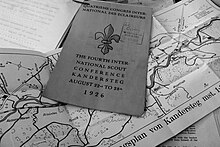Kandersteg International Scout Center
| Kandersteg International Scout Center |
 |
| Owner |
The KISC Association |
| Location |
Kandersteg |
| Country |
 Switzerland Switzerland |
| Coordinates |
 46°29′0.18″N 7°39′50.1″E 46°29′0.18″N 7°39′50.1″E |
| Founded |
12 February 1923 |
| Founder |
Walther von Bonstetten |
| Attendance |
>11,000 annually |
|
|
Website
http://www.kisc.ch/ |
 Scouting portal Scouting portal |
The
Kandersteg International Scout Center (
KISC) is an international Scout center in Kandersteg,
Switzerland. The centre provides lodges, chalets and campsites covering
17 hectares of land. It is open to Scouts year round, as well as to
non-Scouts for most of the year. More than 11,000 young people from over
50 different countries visit the centre every year
KISC is the World Organization of the Scout Movement's (WOSM) World Scout Center.
History
Picture of the campsite in the 1920s
In 1921 the Chief Scout of Switzerland, Walther von Bonstetten, visited Kandersteg on holiday and found an old empty chalet. It was built in 1908 to house the construction workers for the Lötschberg Tunnel.
In 1913, when the tunnel was finished, the chalet was left unused by
the railway company. Von Bonstetten felt that this location could be the
permanent international meeting place that Robert Baden-Powell
had in mind where Scouts from all over the world could meet. Von
Bonstetten wrote to him to let him know what he had found. The response
was positive and on 12 February 1923 the Scouts International Home
Association was set up; on 12 April 1923 the chalet and adjacent land
were bought for CHF 15,100, and the International Scout Center came into existence. In 1930 Baden-Powell visited the site himself.
Flyer and map of Kandersteg distributed to the participants of the 4th International Scout Conference 1926.
Up to current times, the site has continuously been augmented, with
the first national room, 'the Dutch room' in 1927, and the purchase of
additional land in 1929. During World War II, the centre was used to house French soldiers interned for the war.
In the 1950s more property was purchased, including the woods by the
river Kander, and the center began to open also in the wintertime. The center was renamed Kandersteg International Scout Center in 1977. In the
1980s, new campsites were created, together with extra toilet
facilities, although the center went through a difficult time
financially. In 1994, the
International Scout Center Foundation, Kandersteg
was established, and work started on the chalet extension project which
opened on 1 June 1996. On December 2002, the top floor of the New
Chalet was finished, completing the chalet extension, followed by new
bathroom renovations two years later. In 2009, the center opened a new
accommodation building named Kander-Lodge, purchased the neighbouring
building, Sunneblick, and fully renovated the ground floor of the Old
Chalet.
Location
The small, traditional Swiss village of Kandersteg (inhabitants
approximately 1,200) is situated at 1,200 metres above sea level,
65 kilometres south of Bern, in the canton of Bern, near the Lötschenpass and the Gemmipass. The village is known for sightseeing and exploring the Swiss Alps.
Kandersteg can be reached by road and rail: it is situated on the main
railway line from the north to Italy, and the station is served by fast
trains.
The Scout Center is at the southern end of the village. During high season, a regular bus runs from the local railway station.
Campsite
The campsite can accommodate up to 1,400 persons on more than 60
different sites. On average during the summer, the site has around 750
guests at a time. While close to other groups, each group can be sure of
their own campsite, ensuring both an international atmosphere and
privacy. The sites have running water nearby and there are toilets and
showers with hot water close at hand, which the visiting groups help to
look after during their stay. There is a shop open on the campsite
during the summer and a campsite office that is open most of the time.
There is also a drying room and multiple picnic and barbecue facilities.
The campsite was originally wasteland
from the construction of the tunnel, so several sites are rocky. The
railway runs close to some of the sites, so it can be noisy at times.








No comments:
Post a Comment